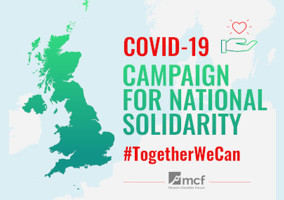Since March 2020, the UK landscape has been forever changed by the Covid-19 pandemic. The ensuing economic and social lockdown through the pandemic has had a dramatic impact on the physical and mental health of thousands of people, with over 41,000 people now confirmed as having died due to Covid-19.
From these figures, it is well-documented that a disproportionate number of BAME people have lost their lives, are at a higher risk of infection, and have been adversely economically affected by the lockdown. BAME households are reported as 1.5 times at a greater risk of food insecurity compared to White households (Food Foundation 2020).
This coupled with the challenges of poverty and socio-economic instability have placed a huge strain on the charities who serve BAME communities. Whilst complex need for charitable assistance existed well before the pandemic, intersectionality has exploded across BAME communities, placing huge urgency and extra pressure on precious and limited resources.
Within these communities, Muslim-led grass-roots groups, small charities, and community organisations are on the verge of buckling under the strain. Accessibility issues mean that of the 175 Muslim-led local charities across the country that we have managed to capture details of in our mapping, only a small number of them succeeded in accessing institutional funding streams (MCF) - despite often serving some of the most marginalised and deprived communities and responding during the peak of Covid-19. Why is this?
Grant giving for good
The generosity and charitable giving of the UK Muslim community is well-reported. Muslims remain the faith group which donates the most overall on an annual basis to charitable causes and there are over 2,000 Muslim-led charities across the UK, ranging from small mosque social action programmes to large NGOs. Relying on a donor base is the normal for these charities but now those same donors are amongst the many who also require support. Why then does funding seem to be out of reach?
Why are take-up figures amongst Muslim charities so low?
A two-sided coin
The connection between a funder and a charity is of course a two-way relationship and issues lie on both sides preventing productive interaction.
1. Charity access:
Knowledge - Many small Muslim charities and community organisations are simply not aware that funding exists and is available to them. Having heavily relied upon supporter donations, good will and good intentions, smaller groups are often first established by volunteers from outside the fundraising sphere. Seeking out new opportunities often doesn’t happen due to insufficient know-how of the whole fundraising sector.
Skills - Smaller Muslim charities can be run by as a few as 2 or 3 people whose focus will often be front-line delivery. Without the understanding or awareness of the grant sector, many often lack the on-boarded skills that are needed to research, write and apply to large funders or indeed navigate the process.
Governance – In addition to the lack of specific skills required for grant writing, governance and policy work can often be lacking. This can be due to a lack of time or simply the size and newness of the charity. Many small Muslim-run charities may have the relevant trustees in place but are unable to devote time or understanding to the level of governance that is required in order to be eligible for funding or apply in the first place. Specific policy creation, financial and monitoring processes alongside stakeholder engagement is essential if these groups are to be able to access the funding available to them.
2. Funder engagement:
Communication – It is clear from the current funding landscape that many funders lack the means to communicate and engage with Muslim groups. Whilst they may well be aware that Muslim-led charities represent a portion of the charity sector, they remain unaware or unwilling to actively reach out and communicate their offer. In many cases, this can be due to refusing to fund faith-led groups or groups that promote faith.
Whilst funders are entitled to set their own criteria, this can demonstrate a short-sightedness of the potential and diversity and the reach of the Muslim charity sector. It could even be argued to demonstrate a fear of any connection with Muslim groups. Many Muslim charities are in fact entirely inclusive in their charitable activities, helping, supporting, and benefiting people of all faiths and none – as the Islamic faith commands. To exclude these charities based on their religion, demonstrates a lack of understanding that could be easily rectified with direct communication.
Lack of board or workforce diversity – To establish better relationships and outreach work that truly benefits the most disadvantaged groups in our society, better workforce diversity is required at funder level and not just on a tokenistic level. Whilst diversity and equality groups are beginning to emerge with more prominence in mainstream funders, work is still required to have the representative voices at the table. Understanding the nuances of Muslim giving, the Islamic faith and the issues pressing Muslim communities now can only truly be understood with valued dialogue at the right levels.
Unattainable criteria – For many funders, demand for funding means stringent eligibility criteria. Whilst this is understandable, it often restricts access for smaller, more culturally diverse and grass-roots groups. High obstacles in the form of governance criteria, income levels, board membership and overly detailed, multi-step application processes are inflexible and result in ring-fenced funding. Excessive monitoring and negative experiences from those Muslim groups who have secured grants are off-putting and bordering on discriminatory.
Feedback – In order to combat the gap in skills knowledge, effective and constructive feedback is required. Few funders give detailed feedback, if at all, meaning that poor applications often fall at the first hurdle and fall again and again. To truly engage with Muslim groups and other sectors who are under-represented, feedback needs to be given which can be learnt from and acted upon.
Is this an issue unique to Muslims?
Not completely no. Many charities which are based on or serve specific cultures, may experience similar issues. BAME groups have not received the resources and funds that they need both prior to and since Covid-19.
But for charities based on Islamic values, there can also be ethical or religious issues. Reluctance or rejection of funding streams which are connected to activities which are considered haram (forbidden) in Islam can mean that some mainstream funders are inaccessible.
Funding that is linked or driven from gambling, sale of arms, alcohol and tobacco or banking funding streams may involve dealing directly or indirectly with interest and other government funds which may compromise or may not have values which align with Muslim charities. What this means is that there are unique and equally credible reasons that prevent Muslim groups from accessing the full scope of the fundraising landscape.
Recommendations
Capacity and confidence building - Skills training, better governance and sharing of best practice can help broaden the skills set of those charities who are not yet ready for funding applications. Furthermore, confidence and trust need to be worked on. Feeling that they won’t be listened to, given credibility, or considered fairly is a concern and funders need to be aware and tackle this through open dialogue that will help both sides learn from one another.
Awareness raising - Funders need to reach out directly to Muslim charities, representatives within the Muslim charity sector and work with them and alongside them in raising awareness. Using social media, webinars and other events, information needs to be given directly to Muslim-led groups for them to understand the range of funding available to them. It is not enough to assume that marginalised and under-represented groups will find and apply to funding streams.
Workstream and board diversity - It’s no secret that many funders need better board and employee diversity. By bringing onboard more racially inclusive staff, as well as engaging with a wider diversity of partners and stakeholders, more voices can be heard at the table and specific needs considered and included. A self-serving narrative can impact on how funding is accessed and can be evidenced through the use of language and accessibility that impinges wider applications.
Bridges are built from both sides and we start seeing emerging new voices from the Muslim and BAME charity sector, working hard to tackling some of these issues. This is a real opportunity for mainstream funders to listen and learn from BAME infrastructure organisations and support them at the same time. It is not enough to just deal with the usual suspects or those who know how to fill their funding applications correctly, it is time to reach out to those who can help connect with grassroot communities as well as good projects and organisations who are unable to present their cases properly.
Related articles
Fadi Itani: How Muslim charities are pulling together to respond to the Covid-19 crisis
Fadi Itani from the Muslim Charities Forum explains how its Our Campaign for National Solidarity is helping organisations work together during the coronavirus crisis.
Fadi Itani: Compassion vs. impact – charities must remember that both really matter
Fadi Itani, chief executive Muslim Charities Forum, says charities must remember that having good intentions and compassion need to be accompanied with delivering real impact for beneficiaries and donors.
Fadi Itani: Let's talk about Zakat and giving during Ramadan
Fadi Itani, chief executive of the Muslim Charities Forum, explains how Ramadan has become a time for increased market awareness and an opportunity to tap into the heightened social and spiritual conscious of the Muslim consumer.












